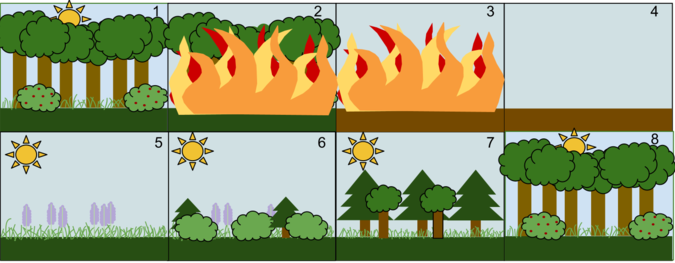Photo Citation: Sebastian Unrau
The Way We Think About Ecological Succession
Ecological Succession is defined as "the process of change in the species structure of an ecological community over time" which is caused by species interactions within this ecological community and the environment (Wikipedia). A common example of ecological succession is the forest succession process where a clearing is created in a forest due to a disturbance, say a fire or flood, then slowly becomes a shrubland then young trees then older trees and then a forest composed of older trees, young trees, and undergrowth such as shrubs, grasses, flowers, etc. An example can be seen in the photo from Wikipedia down below.
The way we think about ecological succession in the academic sciences though is full of language from western culture that is related to social and environmental harm. The first species to grow in a disturbed area are currently called Pioneer Species who are said to colonize the land when they arrive first to a disturbed area. Manifest Destiny, and America's support of pioneers/settlers in history, aimed to conquer the wilderness and violently removed Indigenous people from the land as a part of colonization. The act of colonizing the land was NOT beneficial to the ecological communities as forests were cleared, prairies were plowed, wetlands were polluted by livestock, and predators were exterminated and many prey animals over-hunted. This is a far cry from the way pioneer species who are the first to live on disturbed landscapes often actually improve the stability of the ecosystem and pave the way for the following steps of ecological succession.
For example, during Primary Succession where there is zero or almost no soil, lichens are the first to arrive and over time, contribute to the creation of soil which allows other species to then live there. During Secondary Succession where there was a disturbance, some early arrival plants such as red alder are nitrogen fixers who help increase the amount of nitrogen in the soil, a nutrient that is vital to plants but is very limited.
Due to this connection between the historical pioneers and their contributions to environmental harm through colonization, I propose that pioneer species be renamed to something that reflects their ecosystem benefits more holistically. One potential word could be Initiators as they are the first to arrive at a disturbed site and initiate ecosystem changes. Since not all species who arrive at a disturbed site will inherently support the species that follow, they could also simply be called Early Successional Arrivals. as that succinctly describes how they are first to arrive and thrive. Initiators could be reserved for species such as lichens and red alder who do help support the succession stages.
Currently, the end of the succession stage is called a Climax Community, such as an Oak-Hickory Forest in the Midwest states. This is seen as an end state since the community went from grassland to forest. However, disturbance such as a fire can restart the succession process all over again or there may be several different potential climax states. For example, an Oak-Hickory Forest can become a different type of forest made up of different tree species. Some people do already use Equilibrium Species rather than climax species since the community's species composition only remains that way while it is in equilibrium, and is subject to change. Rather than viewing certain end states as a climax that is inherently supposed to remain, it is better to view ecological communities as constantly in flux at different stages of succession. After all, having only forest and no mixed forest and grasslands would not be able to support as much biodiversity.
Using words to talk about ecological succession that focus on the species' interactions without using words that are based in themes of control/domination or being static as pioneer and climax do, helps to improve our own understanding of the ways ecosystems and ecological communities work while removing language with that violent history.
I have a BA in Environmental Science and MA in Environmental Education and so I have not cited a lot of sources as this is a rather informal blog for my thoughts and I have a lot of professional knowledge about these topics. I have included a few links below though for your own curiosity if you want to learn more about these topics.
Works Cited





